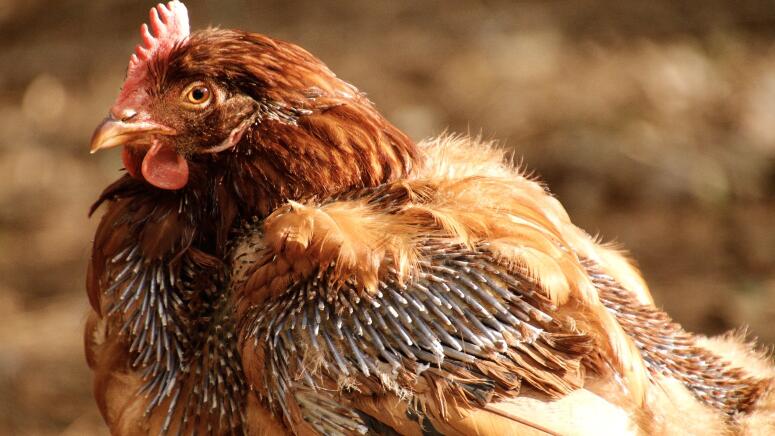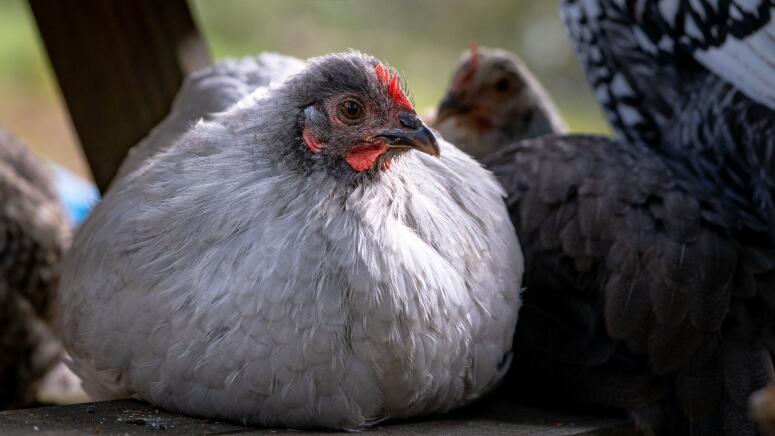One of the most common questions I am asked is, “Why are my chickens missing feathers?” There are a number of reasons for feather loss that can include dietary deficiencies, molting, feather picking, pests and parasites. It will take a bit of detective work on your part to determine why your flock is missing feathers; however, once you have determined the reasons why you can encourage those feathers to return.
Dietary deficiencies are probably the easiest to correct. Be sure that your flock is on the appropriate feed for their age and do not overtreat them. A good ratio to remember is that at least 90 percent of their diet should consist of chicken feed and the other 10 percent can come from treats, garden veggies, fruits, and free-ranging. Feather picking or eating can be related to inadequate protein in their diet.
Poultry parasites such as mites and lice can also cause missing feathers. A good way to find out if you have these unwanted bugs is to look for them and their eggs around the chickens’ vents. If discovered, these parasites can be treated. Seek out a product to treat your entire flock and be sure to thoroughly clean your chicken coop to break the life cycle of the pest.
Did you know that after chickens are a year old they will go through an annual molt, typically in the fall? During this molting period, chickens undergo the replacement of the feathers on their bodies. It is a naturally occurring phenomenon and the degree to which a chicken molts can vary. Sometimes molting chickens appear to be “naked,” missing many feathers, while other times you can hardly tell that a chicken is actually molting.

Molting
Anytime chickens are replacing feathers, it can pose a strain on their bodies because it uses up a lot of energy and protein. The time it takes for a chicken to regrow a single feather takes weeks, and typical molts can last as long as three months.
Sometimes, chicken keepers will notice that egg production slows or even ceases when their hens molt or they are replacing lots of feathers. This is because both eggs and feathers are made almost completely out of protein.
Two main questions usually arise for chicken keepers during the molt. The first is “Can I encourage the feathers to grow in any faster?” And the second one is “When will my eggs return?” The answers to those questions vary. Improving flock nutrition is probably the single most important thing you can do to speed things along and encourage the return of beautiful feathers and fresh eggs.

How to Help Your Molting Chickens
Traditional poultry feeds for laying hens are approximately 16 percent protein. During the molting period, it is often recommended that you place your molting birds back on a grower feed formulation until the molt is complete. During the molt, you can also boost their diet with protein-rich products or supplements. Treats such as mealworms and sunflower seeds are also a great source of protein during times of feather replacement. It is important to boost your flock’s protein intake only during the molting period and then return them to their regular diet when the molt is complete.
Lastly, feather picking can be a result of boredom or a bully chicken. Be sure that your chickens have plenty of living space and the ability to engage with their environment. Living in cramped, confined quarters can cause chickens to peck at one another.
Feather loss can be minimized by feeding your flock an excellent-quality feed, giving them plenty of space, cleaning the coop on a regular basis and not spoiling them with too many treats. Feathers are often quick to return once you get to the root of the cause. Sometimes making a few changes in the way you manage your flock will bring about the return of not only feathers, but eggs.
To help your flock combat missing feathers and ease the molting process, check out Manna Pro® Poultry Protector™, Poultry Conditioner, Mealworm Munchies™ and Calf-Manna®.
Author Profile: Melissa Caughey
Melissa Caughey is a backyard chicken keeper, beekeeper, gardener, and cook who pens the award winning blog, Tilly's Nest. She lives on Cape Cod, Massachusetts with her family of four and her Miniature Schnauzer.
More Blogs by Melissa Caughey:
- https://www.mannapro.com/homestead/housekeeping-for-chicken-keepers
- https://www.mannapro.com/homestead/feather-loss-in-backyard-chickens
- https://www.mannapro.com/homestead/treating-your-chickens-right
- https://www.mannapro.com/homestead/egg-laying-and-optimizing-production-in-backyard-chickens
Feature Products

